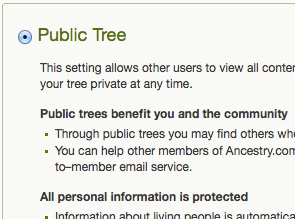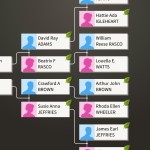I wrote this post four years ago and felt it was worth sharing again. You might be interested to read the comments on the original post because, as usual, readers added valuable information and perspective.
 When I was at the Kentucky Historical Society research room in June, I overheard a conversation between a librarian and a patron. The patron, who displayed a certain amount of naiveté about genealogy research when he asked the librarian whether there was an index to everything in the library, proudly told the librarian that he’d been researching on Ancestry.com for years. The librarian’s response made me raise my eyebrows. He said, with a disapproving tone of voice, “A lot of stuff is wrong there; you can’t really trust those online sites.” I was so surprised by that statement that I wrote it down.
When I was at the Kentucky Historical Society research room in June, I overheard a conversation between a librarian and a patron. The patron, who displayed a certain amount of naiveté about genealogy research when he asked the librarian whether there was an index to everything in the library, proudly told the librarian that he’d been researching on Ancestry.com for years. The librarian’s response made me raise my eyebrows. He said, with a disapproving tone of voice, “A lot of stuff is wrong there; you can’t really trust those online sites.” I was so surprised by that statement that I wrote it down.
This felt all kinds of wrong to me for a couple of reasons. One is that, in one sentence, he invalidated this man’s genealogy experience. The other is that it’s just not true. I probably should have spoken up and argued the point, but I was in a library…it didn’t feel the place for a debate.
But it got me thinking about the notion that online sites like Ancestry or Family Search are inaccurate. I think that the librarian was referring to the family trees that can be found on the sites. Sure, trees are only as good as the practices of the genealogist who created them (or, in the case of Family Search, added to them). Many are not accurate. That’s why I ignore them.
Ancestry is typically the first place I go for source documents when I’m doing online research. It has millions of documents that provide evidence to prove facts in my genealogy research. I usually find them via search, either on a person or in the card catalog. I almost never even look at hints. And I carefully evaluate the suggested records that come up when I’ve clicked on a document in a search. (Usually, they are for the person I’m researching and are hugely helpful.)
Ancestry, along with Family Search, are fundamental to growing my research when I’m researching online (and I’m usually researching online). I was shocked to hear this authority figure completely dismiss online sites.
I was recently talking with a genealogy friend about her quest to solve a mystery. It became apparent that she was using online trees (in combination with DNA matches) as a main avenue for trying to solve the mystery. The conflicts among the trees were frustrating her. I suggested she back away from the trees and look for documents that could prove her suppositions. For me, the documents in Ancestry, not the trees, are where the value lies.
Of course, we must evaluate the documents and the evidence found in them. Good genealogists question everything. Is there inaccurate information on Ancestry? Of course–the family trees are full of them. Do the hints or suggested records sometimes apply to the wrong person? Yes!
But to describe Ancestry as inaccurate is, well, inaccurate. Everything you find in any repository (online or otherwise) must be evaluated. If you use Ancestry as tool to find documents that you then analyze, you’re on the path to success, in my opinion. However, if your starting point at Ancestry is looking at family trees, you may find yourself in the weeds.
My annual subscription to Ancestry is up for renewal this month. I always give it some thought and I always renew. I’m fortunate to be able to afford it; if I were looking to economize, though, Ancestry would probably be the last subscription I’d drop.
What about you? Do you think that the online sites get a bad rap? How do you make sure you’re getting good information from them?

 Back in July, I was pondering uploading my family tree from my Reunion software to Ancestry and trying to decide whether to make the tree public or private on Ancestry.
Back in July, I was pondering uploading my family tree from my Reunion software to Ancestry and trying to decide whether to make the tree public or private on Ancestry. 
